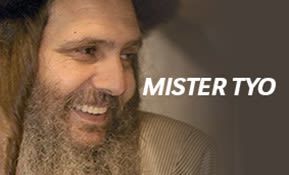
Smithereens
Many think that Judaism’s laws of modesty are for prudes; go ahead and drop the limitations of contact with the opposite sex, and watch your marriage shatter...

A couple of years back, I was picking up my daughter from her friend’s house. As I was waiting at the door, I happened to notice that the usually immaculate interior of the house was a complete and utter tip. Furniture had been left standing haphazardly here and there; papers and possessions were strewn all over the tables and floors.
“Did you just have a burglary?” I asked my daughter’s friend. She looked at me in a funny way, and I could see the tears were welling up behind her eyes.  “Umm,” she hesitated. “My parents are getting divorced.”
“Umm,” she hesitated. “My parents are getting divorced.”
 “Umm,” she hesitated. “My parents are getting divorced.”
“Umm,” she hesitated. “My parents are getting divorced.” I was speechless – it was so out of the blue, and they’d always looked like such a laid back, compatible couple. I didn’t know what else to do, so I gave my daughter’s friend a big hug, and told her that I was really, really sorry. I really was. I really still am. They weren’t close friends of mine – I hardly knew them. But I knew that divorce in almost all cases is a complete disaster for everyone involved.
Of course, there are exceptions. Where a parent or spouse is regularly abusive, or an asocial drug, alcohol or pornography addict, divorce is often the lesser of two evils. But most of the divorces happening today in Jewish circles aren’t for those reasons. People get divorced because they run out of things to say to each other; because they feel as though they are two ships passing in the night; because they no longer have a connection, a kesher Because they think that it will be better and easier by themselves, when they no longer have to take their spouse’s view point into account, and bend over backwards to please someone they don’t love anymore.
And it’s an absolute disaster.
A few days’ after I found out they were getting divorced, but before it was common knowledge, my husband and I bumped into the husband, walking his dog with a couple of his friends. I looked him up and down, trying to spot some sign that this person knew that one of the most important things in his life – his marriage – was on the verge of permanent disintegration.
Nothing. No look of sadness or worry. No inkling that a tragedy was occurring. We spoke for about 10 minutes, and covered a variety of topics including China’s Gross Domestic Product, the weather, and the economy.
I was completely and utterly baffled. This man’s life was unravelling, and he seemed as full of pointless trivia and frivolity as usual. As we walked away, I thought to myself that maybe, just maybe, I’d got it wrong. Maybe they weren’t getting divorced after all?
But they were. The get came through just a couple of days’ later, and then it was common knowledge, as the husband officially moved out of the house. I don’t know why, exactly, but the apparently bloodless nature of that divorce bothered me tremendously.
To get divorced is one thing. To be so blasé about it – especially when there are children involved – was absolutely shocking to me.
A little while ago, I saw the husband again. The kipa had gone. The hair had been grown out, and there was an earring. The man is in his forties, and he was dressing like a stereotypical rebellious teenage boy.
Why am I telling you this?
Because it really brought home to me a few things. Firstly, it made me realise just how casual so many people are about their marriages, and their shalom bayit. Before the divorce, this couple spent an enormous amount of time socialising. There was always time for a dog walk with friends (without the spouse…); for a bike ride with friends (without the spouse…) for a coffee with friends (without the spouse…) – I could go on, but you get the idea.
When it came to doing ‘fun’ things or spending quality time, the spouse definitely wasn’t the priority. In fact, I can barely remember ever seeing them together. One of the few times I actually saw them together, the husband was glued to his laptop, surfing the headlines on Sky news as though his life depended on it.
The second thing it brought back to me is just how much wisdom there is in our Torah, and in the advice of our sages. Sometimes, I read things about keeping tznius, or avoiding unnecessary contact with members of the opposite sex, or avoiding movies, TV and internet, and I occasionally experience a small twinge of doubt.
Sometimes, it seems so extreme…
But then I remember just how much my own shalom bayit has improved since I’ve started to dress more tzniusly. I remember all the ‘flashbacks’ I used to get after watching movies – often for weeks and months afterwards – all of which were very unhelpful, from a spiritual perspective. Or I sit in the park and hear mothers worry about how to keep all the pornographic filth flying around the internet away from their kids.
Just recently, there was some sort of porn spam email that looked as though it was coming from a friend’s email account; open it, and you are immediately assaulted with some of the most disgusting and degrading pictures. I won’t risk doing that to my children. I don’t think it’s ‘one of those things’ that’s unfortunate, but kind of ok. This stuff is strong spiritual poison. Even the smallest amount is incredibly dangerous for souls – and I’m not just talking about kids, I’m also talking about adults.
So, I won’t have internet in the house, and I’m firmly discouraging all but the most basic use of the computer, for school projects. Sounds extreme, doesn’t it? Plenty of people have internet without becoming porn addicts; plenty of people watch movies, dress immodestly, and have friends of the opposite sex and still stay faithful to their spouses.
But plenty of people don’t. Even in ‘frum’ jewish circles. And which of us can say, hand on heart that we ‘know’ for a fact that one terrible day, our yetzer hara won’t trip us up in this area, if we give it half a chance?
I certainly can’t say that. So I’m not taking any risks. I’m doing my best to minimise social interactions with members of the opposite sex; I’m doing my best to dress modestly, even though I often find it hard and frustrating; and I’m doing my best to keep all the pictures and movies of people acting and dressing immodestly out of my home.
And I get a lot of stick about it, from ‘frum’ people who tell me that I’m divorced from reality, and that this stuff is part and parcel of ‘modern’ life. It usually pings off me, but occasionally, it sticks. And on those days, I have to remind myself about the other things that are part and parcel of ‘modern’ life. Like marriages falling apart; like incredibly miserable, stressed people who pop pills just to fall asleep at night or wake up in the morning; like sad-eyed children, who can’t remember the last time their parents really noticed them, or asked them how they are doing.
I think of all the people who weren’t divorced from ‘reality’ who have ended up being divorced instead from a healthy and peaceful home life; from a potentially loving spouse; and from being an ongoing, constant part of their children’s lives – and then I remember that this is one reality I’m more than happy to do without.
Many people think that Judaism’s laws of modesty are for prudes only; only a fool would go ahead and drop the limitations of contact with the opposite sex, and watch his or her marriage shatter into smithereens. Thank G-d, we have a Torah that teaches us how to avoid being a fool.








7/07/2010
be careful in judgements
Rivka, I agree with everything you are saying. Marriage is precious and many people do give up too easily. However, you need to be careful about judging individual situations. You really have no idea what is going on. Your essay includes the story of one family. Imagine how that family might feel if they read your essay, how judged they might feel. (perhaps there was abuse or drug addiction, etc.) Many people judged me when I got divorced. They had no idea what was really going on.
7/07/2010
Rivka, I agree with everything you are saying. Marriage is precious and many people do give up too easily. However, you need to be careful about judging individual situations. You really have no idea what is going on. Your essay includes the story of one family. Imagine how that family might feel if they read your essay, how judged they might feel. (perhaps there was abuse or drug addiction, etc.) Many people judged me when I got divorced. They had no idea what was really going on.